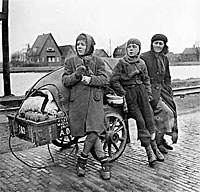Karen Kaplan reports in the L.A. Times on the crushingly disappointing results from a series of clinical trials that have shown that daily doses of vitamins and minerals have no effect on preventing strokes, heart disease or other ailments and in some cases, even cause harm.
Laboratory tests and initial studies in people suggested that lowly vitamins could play a crucial role in preventing some of the most intractable illnesses, especially in an aging population. The National Institutes of Health gave them the same treatment as top-notch pharmaceutical drugs, investing hundreds of millions of dollars in elaborate clinical trials designed to quantify their disease-fighting abilities.
Now the results from those trials are rolling in, and nearly all of them fail to show any benefit from taking vitamin and mineral supplements.
This month, two long-term trials with more than 50,000 participants offered fresh evidence that vitamin C, vitamin E and selenium supplements don’t reduce the risk of prostate, colorectal, lung, bladder or pancreatic cancer. Other recent studies have found that over-the-counter vitamins and minerals offer no help in fighting other cancers, stroke or cardiovascular disease.
Kaplan interviews Jeffrey Blumberg, director of the U.S. Department of Agriculture’s Antioxidants Research Laboratory at Tufts University in Boston. His research, she notes, has been funded in part by supplement makers.
Blumberg says, “You really do need vitamin E. You really do need vitamin C. You really do need seleniun,” adding, “Without them, you die.”
This begs the question of whether taking them in supplement form fends off illnesses.
“Blumberg and others now believe.” Kaplan writes, “that a combination of factors — including the versions of vitamins that were tested and the populations they were tested in — probably doomed the studies from the start.”
Kaplan also interviews Dr. Mary L. Hardy, medical director of the Simms/Mann UCLA Center for Integrative Oncology, “who focuses on the importance of diet and supplements for cancer patients.”
“‘You don’t eat a food that just has beta carotene in it,’” Hardy tells Kaplan. “What’s more, she said, vitamins manufactured into pills are not identical to vitamins that occur naturally in foods, so the clinical trials don’t test the exact compounds that may have been key in earlier studies.
Full story from L. A. Times December 21, 2008


 In Holland in 1944-45 during World War II a food embargo led to famine. Research indicates that children conceived during the Dutch Hunger Winter experienced detrimental health effects six decades later. Pre-natal exposure to the famine has been associated with
In Holland in 1944-45 during World War II a food embargo led to famine. Research indicates that children conceived during the Dutch Hunger Winter experienced detrimental health effects six decades later. Pre-natal exposure to the famine has been associated with 



